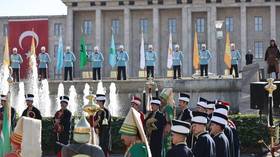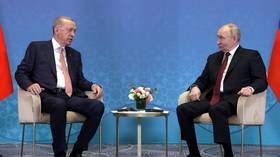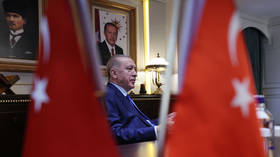Türkiye’s ‘foreign agents law’: Ankara fights back against Western meddling
The NATO member is pushing back against influence operations from abroad, and the opposition is predictably unhappy
Once again, Türkiye has reignited discussions surrounding its Foreign Influence Agent Law.
The ruling Justice and Development Party (AKP) has presented a bill to parliament, which many have already dubbed Türkiye’s version of the “foreign agent” legislation seen in Russia and Georgia. The idea of adopting such a law has been considered in Türkiye for several years, especially amid strained relations with its Western allies.
As early as May of this year, the proposed Foreign Influence Agent Law sparked concern and criticism from pro-Western liberals due to its potential impact on press freedom. The Ninth Judicial Reform Package, introduced to the public as part of a judicial reform, contains provisions that many believe pose a threat to freedom of expression, the activities of civil society organizations, and the democratic operations of NGOs.
The proposal included an addition to Article 339 of the Turkish Penal Code under the “other acts” section, aimed at punishing individuals conducting research or acting on behalf of foreign states or organizations against Türkiye’s security or political interests. This was also intended to apply to those jeopardizing state preparations for war, military effectiveness, or movements, with such individuals subject to prosecution with the approval of the Minister of Justice.
The package was expected to be submitted to the Grand National Assembly of Türkiye (TBMM) by the end of the legislative session on July 1, 2024. It was designed to amend the Turkish Penal Code to implement new criminal provisions. These provisions expanded the definitions of “espionage” and “intelligence activities,” encompassing those labeled as “foreign influence agents.” However, the initiative ultimately did not materialize.
Now, the Foreign Influence Agent Law has resurfaced, and in the coming days, the draft is set to be brought before the General Assembly of the TBMM. The bill is comprised of 23 articles, includes provisions that significantly strengthen the penalties for espionage and subversive activities in the country.
According to the pivotal 16th article of the document, an amendment will be made to the Turkish Penal Code (TCK) establishing a new category of espionage-related offenses. The new article will be added to the section of the TCK dedicated to “Crimes Against State Secrets and Espionage.” It prescribes a prison sentence ranging from 3 to 7 years for individuals acting in the interests or under the directives of a foreign state or organization in a manner detrimental to the security or political interests of Türkiye. Moreover, if such a crime is committed “during a war or in a situation that endangers military operations,” the punishment can be increased to 8–12 years of imprisonment.
Ankara aims to curb Western influence
It is obvious that Western countries, such as the United States, the United Kingdom, and EU member states, often resort to leveraging individuals, non-governmental organizations, and media outlets to propagate their ideologies and safeguard their interests within other nations. Turkish authorities have long noted such interventions, particularly during the municipal elections held on March 31, 2024. During this time, several Western countries openly supported candidates opposing the ruling AKP, sparking significant concern among the political elite.
On October 29, in his speech commemorating Republic Day, Turkish President Recep Tayyip Erdoğan highlighted the numerous challenges Türkiye has faced over the past six years. He emphasized that the nation is under pressure from external forces seeking to undermine its stability in economic and political domains, especially concerning national security. His remarks came in the wake of a recent terrorist attack in Ankara, which shook the country and heightened fears regarding security threats. This incident, which resulted in casualties and injuries, further underscored Türkiye’s vulnerability and reinforced the urgent need for enhanced security measures.
In this context, the head of the Presidential Communications Directorate, Fahrettin Altun, noted that “a number of Western countries aim to destabilize Türkiye through their support of terrorist organizations.” Such events and statements have strengthened the resolve of those backing the new legislative proposal, which they argue will serve as an essential tool in preventing foreign states and groups from interfering in Türkiye’s domestic affairs and will ensure stricter oversight of activities that pose a threat to national security.
Beyond statements regarding political interference, Turkish authorities have expressed concern over the funding and influence of non-governmental organizations, many of which receive foreign support. The ruling AKP stresses that such organizations often act as intermediaries for foreign interests, undermining internal stability and the country’s sovereignty. Government officials argue that these structures can engage in propaganda, distorting public perception of state actions and destabilizing public opinion.
In recent years, Türkiye has experienced numerous instances where information disseminated by NGOs and independent media, supported with Western funds, has fueled social unrest and protests. Against this backdrop, AKP legislators claim that the proposed foreign agent law will enhance transparency and control over the activities of the organizations receiving foreign funding, and preventing their use as instruments for political interference.
The proposed law on foreign agents, currently under discussion by the AKP, includes provisions mandating stringent reporting and registration for organizations and individuals receiving financial support from abroad. According to the authors of the bill, this will ensure the transparency of funding sources and prevent the covert manipulation of public opinion. Turkish authorities maintain that, in the face of global challenges and threats to stability, measures to safeguard sovereignty and tighten control over foreign agents’ activities are essential for ensuring the nation’s security and stability.
The West is unhappy – Turkish opposition pushes back
Opposition parties and human rights organizations, on the other hand, have voiced their concerns that the law could restrict freedom of speech and weaken the activities of independent media and NGOs. Government officials, however, insist that the primary goal is not to suppress criticism but to protect national interests and prevent subversive activities aimed at undermining Türkiye’s sovereignty.
Commenting on the Ninth Judicial Reform Package – part of the May initiatives by the authorities – Öztürk Türkdoğan, co-chair and spokesperson for the Human Rights Committee of the People’s Equality and Democracy Party (DEM), noted that the Foreign Influence Agent Law paves the way for penalizing journalists, civil society activists, politicians, and researchers. Türkdoğan emphasized that such laws aim to criminalize participants in social movements as well as the exercise of fundamental rights and freedoms, particularly the right to freedom of expression and assembly.
Deniz Yücel, deputy chairman and spokesperson for the main opposition Republican People’s Party (CHP), condemned the amendment, stating: “With the regulation on the Foreign Influence Agent Law, anyone who criticizes the government could be labeled as an ‘agent’ and subjected to arrest and imprisonment. This is a direct violation of freedom of speech and freedom of the press, creating an atmosphere of fear in society. We stand against this provision.”
Journalist Irfan Aktan said that the AKP’s efforts to criminalize journalism and suppress press freedom are not new, but the concept of “foreign influence agents” poses a fresh threat. Aktan explained, “There is a significant difference between imprisoning someone as a journalist and imprisoning them as an agent. Labeling someone as an agent diminishes public outrage and further criminalizes the individual. This is a very dangerous initiative.” He added that this regulation could potentially make all journalists suspects, not just the opposition press.
On October 22, leading Turkish journalist associations issued a joint statement warning that the new amendment poses a substantial threat to press freedom. The document highlighted that the draft law, initially proposed in May as part of the Ninth Judicial Reform Package and withdrawn after mass protests, is now resurfacing with different amendments. According to journalists, the main goal of this initiative is to strengthen control over criticism of the government and create legal ambiguity in the field of investigative journalism. The emergence of the term “Foreign Influence Agent Law” in the Penal Code heightens fears due to the vagueness of phrases such as “against internal and external political interests” and “foreign organization.”
Members of the opposition are also becoming increasingly apprehensive. CHP deputy group chairman Murat Emir has warned that the adoption of the amendment could lead to a “witch hunt,” drawing parallels to practices in Russia and Georgia, and accused Erdoğan of following in Moscow’s footsteps.
With such statements, the opposition and pro-Western forces openly display their values and confirm that Western countries are unlikely to allow Turkish authorities to pass the foreign agent law without resistance. Although no sharp criticism has been officially expressed regarding the Turkish authorities’ initiative, palpable tension can already be observed among various public organizations and opposition political forces.
Türkiye will not tolerate any threat to its sovereignty
Supporters of the bill, including Chairman of the Justice Commission of the TBMM and AKP legislator Cüneyt Yüksel, argue that its introduction is essential to combat modern methods of espionage. According to Yüksel, the current definitions of espionage in criminal law are outdated, as they only address the transmission of documents and information. The new amendments are designed to prevent the use of other methods employed by foreign states and organizations to conduct operations within Türkiye. A notable example is the case of Metin Gürcan, accused of disseminating classified information and subsequently partially acquitted, yet convicted for obtaining data that threatened national security.
The idea of tightening legislation related to foreign influence and activity emerged amid growing tensions between Türkiye and the Western countries. Turkish authorities view the adoption of new measures as a necessary response to actions they perceive as interference in the country’s internal affairs.
The ruling party considers the Western push for democratic reforms and support for various political and social groups in Türkiye as attempts to destabilize the country and undermine national security.
As Türkiye strives to bolster its national sovereignty and carve out an independent path, it is increasingly distancing itself from Western influence and developing closer ties with alternative centers of power such as Russia, China, and the BRICS nations. This shift has become more apparent amid the deterioration of relations with the West over issues including regional security and domestic policy. Türkiye seeks to demonstrate that its actions are driven by national interests rather than external directives, underscoring its pursuit of greater autonomy in decision-making. Such a policy enables Ankara to enhance its influence on the international stage and diversify its foreign policy alliances, despite the dissatisfaction of its Western partners.
For Washington and its allies, this situation is cause for serious concern, as Türkiye remains an important NATO member and a strategically significant nation at the crossroads of Europe and Asia. Ankara’s drift away from Western influence could weaken the alliance’s position and alter the balance of power in the region. In response, Western powers may attempt to destabilize Türkiye, applying economic pressure or supporting opposition movements. Türkiye’s rapprochement with Russia and its aspiration to participate in BRICS initiatives are seen as a challenge to the existing world order, and Washington is likely to seek to curb this influence to maintain control over its strategic partner.
Within Türkiye itself, there is also a polarization of society regarding the ruling party’s policies. Part of the population supports the AKP’s efforts to strengthen national independence and counter foreign interference, while the opposition fears that the introduction of the new law could lead to increased control over civil society and the suppression of critical voices. Opposition parties and human rights organizations have expressed concerns that the law could be used to restrict freedom of speech and the activities of independent media and NGOs, a point that has already been made by international human rights groups.
Nevertheless, Turkish authorities continue to insist that the bill is aimed solely at protecting national security and sovereignty. Supporters of the law argue that strengthening oversight of activities funded from abroad will serve as a tool to prevent covert forms of foreign interference and enable Türkiye to face modern challenges associated with destabilization through informational and other hybrid methods of influence.









Comments are closed.